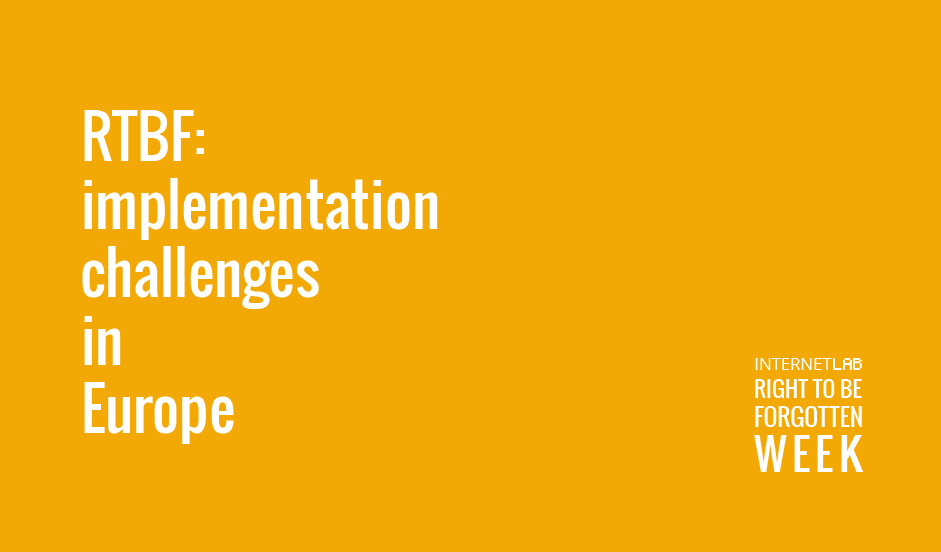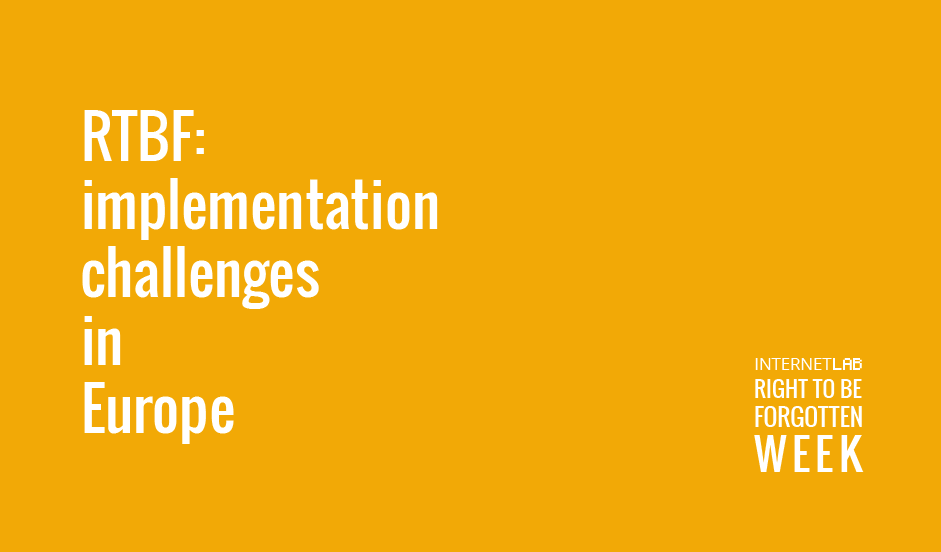
[#2][special week] RTBF: Implementation challenges in Europe

How has the implementation of a “right to be forgotten” been carried out in Europe? The question seems very specific, but it is important since the subject has never been the same after the Court of Justice of the European Union recognized the right of individuals of requesting to search engines the “deindexation” of search results regarding their names (that is, the removal of such results from the list of links shown after the search is concluded).
What are the challenges that arise from that decision? How to assess the consequences of this case in Europe? In order to better understand the issue, check out the first topic addressed yesterday by InternetLab’s RTBF Week: “what is the right to be forgotten?”.
The decision of the Court of Justice of the European Union
In May 2014, the Court of Justice of the European Union declared that European citizens hold deindexation rights against search engines, like Google, Bing or Yahoo. These rights were popularized under the name “right to be forgotten”. In the case analyzed by the European Court, Mario Costeja González, a Spanish lawyer, requested the removal of references to two news articles published in 1998 about the auction of one of his properties. The auction was held in order to settle the debts Mr. González had with the Spanish social security system. The references were on top of the result list of searches made for his name on Google. His main argument was that, so many years after the auction, the fact had become irrelevant and deserved to be “forgotten”.
On the occasion, the Court decided that the individual right to privacy and data protection (of those who requested “to be forgotten”) should be balanced with the general public interest regarding the access to information (of all of those who have — or may someday do — interest in accessing information which could be “forgotten”). Besides, it highlighted that this balancing depends on the nature and the sensitivity of the information under analysis, as well as on the public profile of the person who is requesting the deindexation. Whenever this balancing leans towards individual rights, Google should rectify, erase or block inaccurate, inadequate, irrelevant or excessive personal information, both for the purpose of data processing and historical, statistical or scientific ends.
The decision started a major public debate. On one side, their supporters argue that the case represents a way of dealing with the “eternizing” of the past through search engines, what would create additional difficulties for the leading of a private life. The idea behind it is that before these engines, facts of our personal history were usually forgotten over time. On the other side, people who criticize the Court’s decision argue that it makes way for censorship and the manipulation of one’s publicized past. More than that, they argue that a company shouldn’t be in charge of deciding what kind of information meets the right criteria to “be forgotten”.
Exclusive interview: the implementation challenges regarding the “right to be forgotten” in Europe
Julia Powles, a Cambridge University researcher, was interviewed by InternetLab. She talks about the implementation of the right to be forgotten in Europe after the decision of the Costeja vs. Google Spain case and the debates triggered by it, even in Brazil.
“Is the right to be forgotten working as intended?”
In this video, Powles mentions the disputes and interests involved in the implementation of the right to be forgotten in Europe, highlighting the tension between Google and the media organizations, which seek more participation in the procedures regarding the content deindexation carried out by the company. Access the article mentioned on the interview here.
“EU: the right to be forgotten understood as deindexation”
Thereafter, Powles talks about the main consequences of the decision on the Costeja vs. Google Spain case in Europe and its implementation in the EU.
“Jurisdiction and decision-making: the limits of the right to be forgotten”
When implementing the right to be forgotten established by the Court of Justice of the European Union, Google initially limited the deindexation to the domains where the requests were originated, like Google.de or Google.fr. Nowadays, the company debates with French authorities about the global deindexation of content. Moving forward with the interview, Julia Powles addresses the issue.
“Right to be forgotten in Brazil: leading cases”
On this part of the interview, Powles comments on the Aída Curi and Candelária massacre cases, two of the main ones involving the right to be forgotten in Brazil. Both cases concern requests presented to Rede Globo (a TV channel) in order to not air documentaries about famous crimes, which happened decades ago.
“How to reconcile memory and forgetting?”
There’s an apparent tension between the public interest in accessing information, freedom of speech and transparency and the right to be forgotten. Here, Powles highlights the importance of discussing the issue locally, as well as of the development of guarantees that assure the non-distortion of this right in Brazil.
“Risks in the implementation of the right to be forgotten”
On the last part of the interview given to InternetLab, Julia Powles emphasizes that the right to be forgotten is particularly meant for people who do not have a relevant public profile, but those who are exposed by information that appears on the top search results on Google, affecting their daily lives.
Transcription of the interview with Julia Powles on RTBF
Team responsible for the content: Dennys Antonialli (dennys@internetlab.org.br), Francisco Brito Cruz (francisco@internetlab.org.br), Jacqueline Abreu (jacqueline@internetlab.org.br), Beatriz Kira (beatriz.kira@internetlab.org.br), Thiago Dias Oliva (thiago.oliva@internetlab.org.br), Ana Luiza Araujo (analuiza.araujo@internetlab.org.br).
